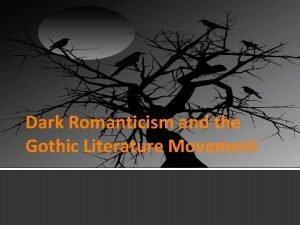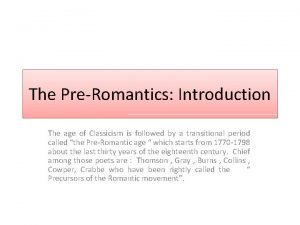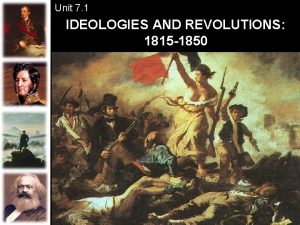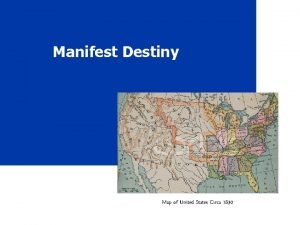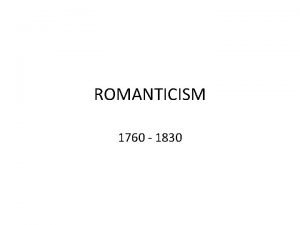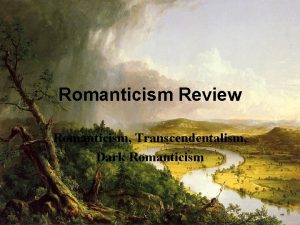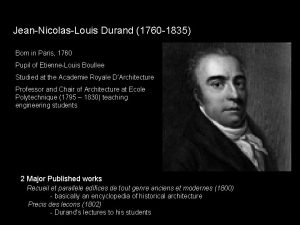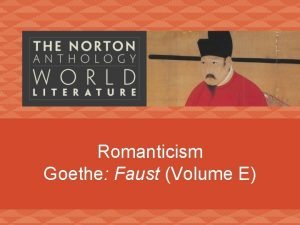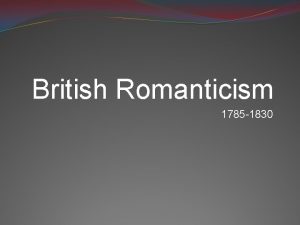ROMANTICISM 1760 1830 ROMANTICISM Cultural phenomenon involving all








- Slides: 8

ROMANTICISM 1760 - 1830

ROMANTICISM Cultural phenomenon involving all Europe Germany The German branch was introduced by the so-called “Sturm und Drang” movement and was mainly philosophical England the English current was best represented by poetry Italy The Italian romantic movement developed a bit later, in 1816, and had its best representative in A. Manzoni, a poet and a novelist. France the French current found its best expression in drama and literary criticism.

Romantic Key Concepts Great emphasis on : Personal experience and the importance of imagination; The artist as an original creator, not influenced by any neoclassical models or rules; The idea of Nature as: a. a vital force and a living structure; b. a means of conveying fundamental spiritual truths; c. a source of feelings; Childhood

Imagination – three different interpretations Blake’s meaning • the capacity to see more deeply into the life of things, to see beyond surface reality, to see reality as it is, with both its positive aspects, if there any, and the negative ones; • a capacity that enables the poet to reveal the ills of society to mankind; • this notion of imagination does not imply the existence of two worlds, the world is only one, what differs is the way we look at it.

Imagination – three different interpretations Wordsworth’s meaning a faculty of the mind that enables to understand the truth which is beyond the power of reason, of senses, of common experience. this notion implies the existence of two worlds, one ordinary and another one transcendental and supersensible (=spiritual). Thanks to imagination the poet leads the readers into this transcendental world and shares with them a profound, spiritual and almost religious experience.

Imagination – three different interpretations Coleridge’s meaning • the sovereign creative power • primary imagination • the human capacity to: a) perceive b) produce images c) to give a certain shape and order to the material (i. e. the world) perceived. • secondary imagination • the faculty the poet uses, not only to give shape and order to a given world, but mainly to build and create new worlds.

Nature according to Romantics A source of feelings: Nature comforts man in sorrow. It is a source of pleasure and joy, it teaches man to love and to act in a moral way. An Active Force Nature is also the seat of the spirit of the universe. Some sort goddess which manifests herself in the wild isolated countryside. The expression of God who is everywhere and, therefore, can be found everywhere. The evidence of a wonderful mysterious power which permeates universe and deserves religious reverence and love. The reflection of the perfect world of “ideas” characterised by the lack of time and space.

Childhood • During the Enlightenment ( i. e. the Age of Reason) children were not valued for what they were – irrational and spontaneous beings – but for what they might become as adults – i. e. human beings characterized by rationality and willing to accept all social conventions and rules. This was the consequence of the great emphasis the society of that time placed on Reason. • Jan Jacques Rousseau (1712 -1778), a French philosopher and writer, instead, developed a completely reversed vision of childhood. • He believed that man is good by nature but corrupted by society and, accordingly, childhood is the most important period of man’s life because this phase of human life is closer to “the ideal state of nature” and therefore the least corrupt.
